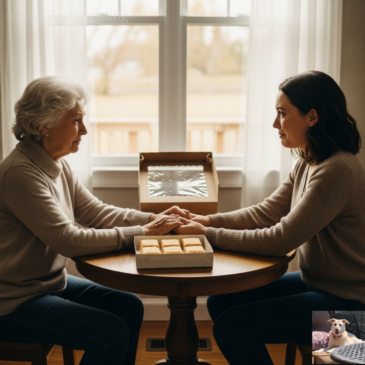Not cruel. Not cold. Just… hard.
She was the kind of woman who never cried at movies, who believed scraped knees didn’t require sympathy, just antiseptic and a Band-Aid. While other kids’ moms packed love notes in their lunches, mine packed protein. While their mothers hugged them at the school gate, mine waved from the car window and said, “You’ve got this.”
It wasn’t that she didn’t love me. I think I always knew she did. But she carried love like a soldier carries a shield—protective, silent, disciplined.
Growing up, I needed softness. I needed words like “I’m proud of you,” or “I’m sorry,” or “That must’ve been hard.” But they never came. Not when I failed a math test in seventh grade. Not when I got dumped before prom. Not even when I called her crying from my college dorm room freshman year, homesick and scared.
She just told me to be strong. To push through.
And so, eventually, I did.
I stopped calling when I was upset. I stopped expecting her to ask questions about my life that went deeper than “How’s work?” I stopped letting myself hope that maybe—just maybe—she’d show up differently.
I didn’t stop loving her. But I built my own armor.
Then last year, just after I turned 32, we had a fight.
It was over something small. A comment she made about how I wasn’t “moving fast enough” in life—marriage, kids, a bigger house. I snapped back, saying she had no idea what I was carrying. That she never had. That she never really showed up for me.
I remember her face—how pale she looked. And how quiet.
She didn’t defend herself. She just said, “Maybe you’re right,” and left my apartment.
We didn’t speak for almost a month.
Then, one Sunday afternoon, she asked if she could come over. She brought a box of lemon bars from my favorite bakery, even though she doesn’t like sweets.
We sat in my kitchen. At first, in silence.
Then she looked at me and said something I never expected to hear:
“I’m sorry.”
I blinked, unsure I’d heard her right.

She continued, her voice low and unfamiliar.
“I didn’t know how to be what you needed. I was raised by a woman who never told me she loved me, not once. She believed tough love was the only love that mattered. I thought that’s what I was giving you.”
“But you’re right. I missed things. Big things. And I’m sorry.”
Tears welled up in her eyes—another first.
And suddenly, I saw her not just as my mother, but as a daughter who had never been taught tenderness. A woman who had carried her own unmet needs in silence and tried to parent from a blueprint she didn’t get to design.
In that moment, I didn’t feel anger.
I felt grief.
For both of us.
I reached across the table and took her hand.
“I know you tried,” I said quietly.
We cried together. Really cried.
That afternoon didn’t erase the past. It didn’t undo the years I spent yearning for something I didn’t get. But it opened a door. One I never thought she’d be willing to step through.
Since then, things are still imperfect—but better. She asks more questions. She listens without rushing to solve. And sometimes, when we part, she hugs me just a little tighter than before.
And I hug her back—like I’m hugging the version of her that never got to be soft.
Final Thought:
Sometimes, the words we wait our whole lives to hear don’t come until both hearts are ready. And when they finally arrive—not perfectly, but honestly—they have the power to heal generations of silence.



